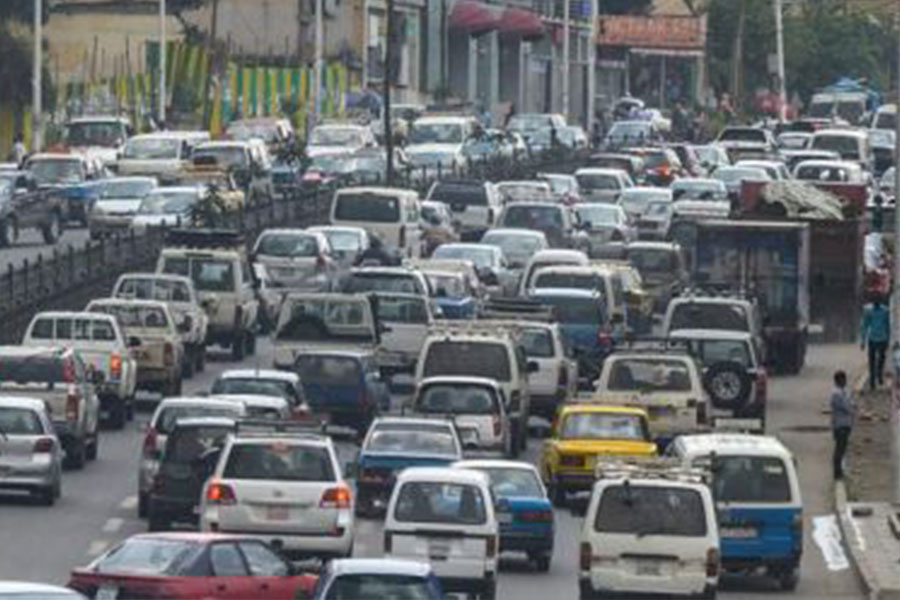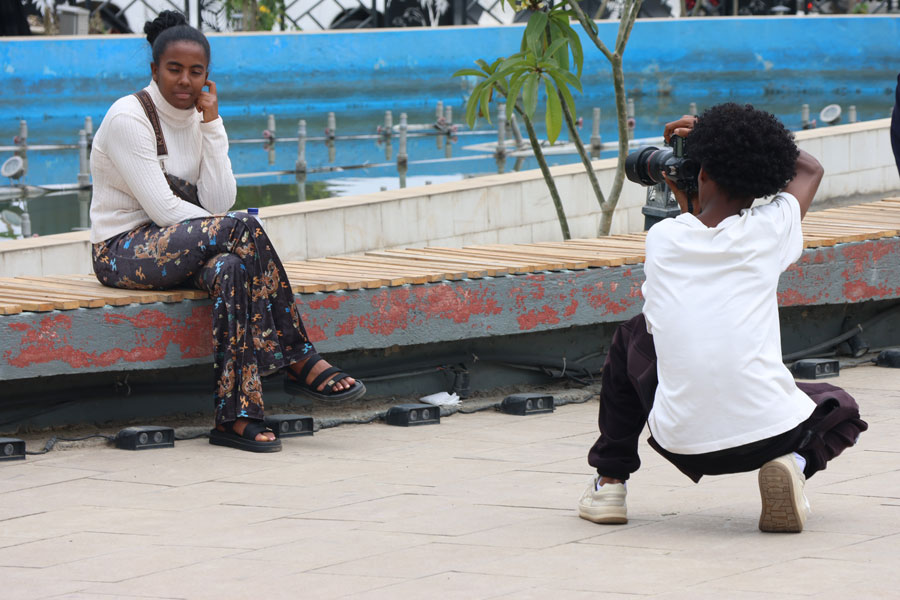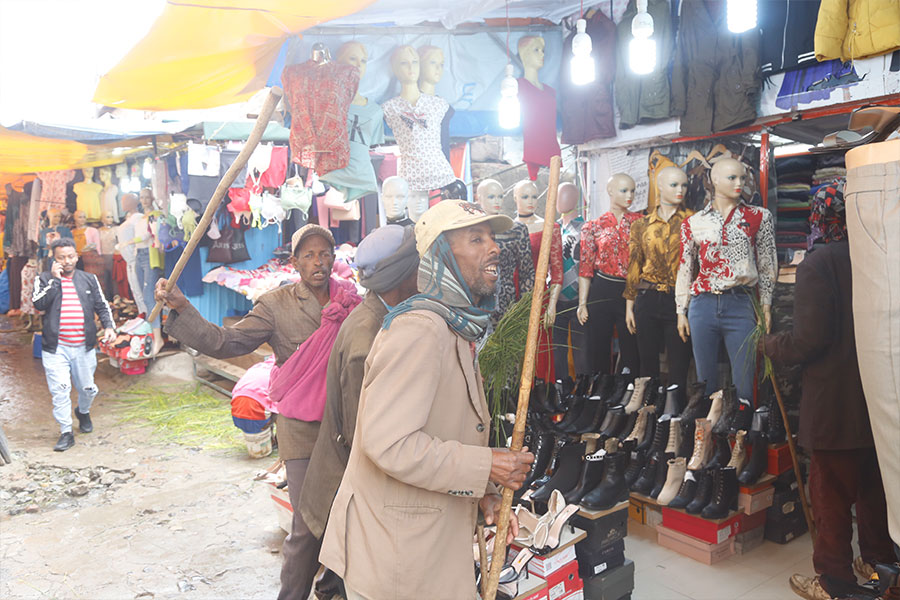
View From Arada | Jun 15,2024
May 21 , 2022
By Hakim Benbadra
Addis Abeba is a fascinating city. I frequented different societies and observed that from one neighbourhood to another, the vision of the world could change radically. From Jemo to Bole through Sarbet. Young and old, western expats, members of the diaspora, employees of the African Union and Ethiopians from all over the country. Unemployed, retired, working, artists, students, and entrepreneurs. I experienced the different social realities of Addis Abeba.
One quickly realises that the different worlds do not mix. Often, one can get a good idea of a person's social position by the place where they meet for a cup of coffee: rather Piazza or the neighbourhood café, Bole Millennium or the big hotels. Each site brings encounters with different people: from hip places like the many lounges where the diasporas meet, to more artistic places like Fendika.
Some parties always bring their share of Western expats, like editions of Zema Mezekir or Zoya. I met Ethiopians who spoke English without an accent even though they had never been out of the country – the only country where I could observe this phenomenon so far. Likewise, there were locals who did not speak English very well with whom we communicated in a mixture of English and stammering Amharic around coffee shops.
And do not forget the African diasporas, with whom I got on well and who socialise mainly by nationality. They are not easy to find. The fact that will have impressed me the most was that each group was unaware of the others. One of the groups that I did not manage to integrate was composed of Ethiopian-born people who Europeans adopted at an early age. They mix very little and go out in community.
Hanging out with the diaspora group was an enriching experience. These Ethiopians have managed to create a Western life for themselves while keeping some aspects of Ethiopian culture in their lives. They usually live with their families when they are not married and most often socialise with other members of the diaspora. They rarely mix with expats or locals. They have their own places and activities for socialising. I remember a brunch at a hotel in Megagnagna where I was the only foreigner among diasporans who had lived in North America.
Ethiopians in the diaspora, born and raised in Ethiopia and educated in the West, are mainly people who invest in the local economy through real estate or entrepreneurial activity. The pandemic has also enabled some of them to return to the country and work remotely for periods, thus irrigating the Ethiopian economy with their foreign currency. Other social groups in Addis Ababa may look at them with envy. Still, one cannot take away from the diasporas that their economic presence is beneficial in these economically challenging times.
The variation in prices from one neighbourhood to another is a classic emanation of the spatial division of these worlds, each of which occupies Addis in its own way. Expenses can range widely depending on the neighbourhood. I have seen diasporas spending in one evening what the average Ethiopian earns in a month's work and even have brunches for prices close to those in North America; others have juices in juice bets and street coffee, often good quality traditional coffee at a democratic price of no more than 10 Br.
I sometimes felt like I was living in parallel worlds where I could spend 45 Br for a juice here and more than five times that for the same juice somewhere else. Another aspect of socio-spatial distance is that one often has to drive to get to certain places at night, especially those that are still open after 8pm and where one can have a drink or dinner. Public transport becomes scarce after dark and even invisible after 9pm. This accentuates the gaps between the different strata of society that can socialise after dark. The most popular classes go home on the last buses. Only those who can afford a cab, taxi hailing or have a car are left in the open bars and clubs.
The societies of Addis continue to evolve in parallel day and night. It is the privilege of the outsider to be in a position to witness the unique societal dynamics that cross the Ethiopian capital.
PUBLISHED ON
May 21,2022 [ VOL
23 , NO
1151]


View From Arada | Jun 15,2024

My Opinion | Aug 23,2025

Featured | Jun 29,2025

Delicate Number | Nov 13,2021

Radar | Sep 10,2021

Photo Gallery | 174023 Views | May 06,2019

Photo Gallery | 164248 Views | Apr 26,2019

Photo Gallery | 154350 Views | Oct 06,2021

My Opinion | 136611 Views | Aug 14,2021
Editorial | Oct 11,2025

Dec 22 , 2024 . By TIZITA SHEWAFERAW
Charged with transforming colossal state-owned enterprises into modern and competitiv...

Aug 18 , 2024 . By AKSAH ITALO
Although predictable Yonas Zerihun's job in the ride-hailing service is not immune to...

Jul 28 , 2024 . By TIZITA SHEWAFERAW
Unhabitual, perhaps too many, Samuel Gebreyohannes, 38, used to occasionally enjoy a couple of beers at breakfast. However, he recently swit...

Jul 13 , 2024 . By AKSAH ITALO
Investors who rely on tractors, trucks, and field vehicles for commuting, transporting commodities, and f...

Oct 11 , 2025
Ladislas Farago, a roving Associated Press (AP) correspondent, arrived in Ethiopia in...

Oct 4 , 2025
Eyob Tekalegn (PhD) had been in the Governor's chair for only weeks when, on Septembe...

Sep 27 , 2025
Four years into an experiment with “shock therapy” in education, the national moo...

Sep 20 , 2025
Getachew Reda's return to the national stage was always going to stir attention. Once...

Oct 12 , 2025
Tomato prices in Addis Abeba have surged to unprecedented levels, with retail stands charging between 85 Br and 140 Br a kilo, nearly triple...

Oct 12 , 2025 . By BEZAWIT HULUAGER
A sweeping change in the vehicle licensing system has tilted the scales in favour of electric vehicle (EV...

Oct 12 , 2025 . By NAHOM AYELE
A simmering dispute between the legal profession and the federal government is nearing a breaking point,...

Oct 12 , 2025 . By NAHOM AYELE
A violent storm that ripped through the flower belt of Bishoftu (Debreziet), 45Km east of the capital, in...